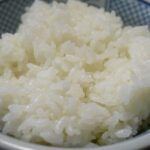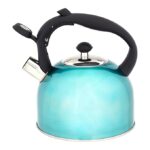Use Herbs and Spices Instead of Sugar and Salt
Today, I am talking about a flavorful adventure in the world of healthy cooking – How to use herbs and spices instead of sugar and salt. Imagine a kitchen filled with tantalizing aromas, a table laden with colorful dishes, and the promise of vibrant, delicious meals that are not just good for your taste buds but also for your well-being.
We all know that sugar and salt are bad! But we don’t wont to eat bland, tasteless, and boring food. The trick is to know how to use herbs and spices as your culinary secret weapons. These tiny powerhouses of flavor have the incredible ability to transform ordinary dishes into extraordinary feasts, while reducing your reliance on excessive salt or sugar.
So, fasten your apron, sharpen your knives, and get ready to discover how these magical ingredients can take your cooking to new heights.
Why Sugar and Salt are Not Good for You
Excessive sugar and salt intake can contribute to several health conditions and illnesses. Here are some common ones –

Hypertension (High Blood Pressure) – Excess sodium (found in table salt) in the diet can lead to the retention of water in the body, which increases blood volume and subsequently raises blood pressure. Persistent high blood pressure, or hypertension, is a significant risk factor for heart disease, stroke, and kidney disease.
Type 2 Diabetes – Excessive sugar intake, especially in the form of added sugars like those found in sugary beverages, candies, and processed foods, can contribute to the development of type 2 diabetes. Consuming too much sugar over time can lead to insulin resistance, where the body’s cells don’t respond well to insulin, a hormone that regulates blood sugar.
Obesity – Both excess sugar and salt can contribute to weight gain and obesity. Foods high in sugar are often calorie-dense but nutrient-poor, leading to overconsumption. High-sugar and high-salt diets can disrupt the body’s natural appetite-regulating mechanisms, making it more challenging to control food intake.
Cardiovascular Disease – Excess salt intake can contribute to the development of cardiovascular diseases by raising blood pressure and increasing the workload on the heart. A high-sugar diet can lead to obesity, high triglycerides, and high LDL cholesterol levels, all of which are risk factors for heart disease.

Dental Problems – Excessive sugar consumption is a well-known contributor to dental issues like tooth decay and gum disease. Sugar provides a food source for harmful bacteria in the mouth, leading to the production of acids that erode tooth enamel. High-sugar beverages, including soda and fruit juices, are particularly harmful to dental health.
Let’s look closer at the idea of using herbs and spices instead of sugar and salt
The Health Benefits of Herbs and Spices
Reduced Sodium Intake – One of the most significant advantages of using herbs and spices is their ability to enhance the flavor of food without relying on excessive salt. Excess sodium intake can contribute to high blood pressure and other health issues, which are of particular concern for seniors. By choosing herbs and spices, seniors can reduce their sodium intake while still enjoying delicious, flavorful meals.
Blood Sugar Control – For seniors with diabetes or those looking to manage their blood sugar levels, reducing sugar intake is crucial. Herbs and spices offer a variety of flavors without adding sugar. Cinnamon, for example, is known to help regulate blood sugar levels. It can be used to add sweetness and warmth to dishes without the need for added sugar.
Antioxidant Properties – Many herbs and spices are rich in antioxidants, which help protect cells from damage caused by free radicals. Antioxidants can support overall health, especially as individuals age and become more susceptible to oxidative stress. Spices like turmeric, oregano, and cinnamon are particularly potent sources of antioxidants and can be easily incorporated into meals.

Tasty herbs and spices to use in your kitchen
Basil – Basil is rich in antioxidants and contains essential oils that have anti-inflammatory properties. It’s also a good source of vitamin K, which supports bone health. Use fresh basil leaves to make pesto, add chopped basil to tomato-based pasta sauces, or sprinkle it over salads and pizzas.
Rosemary – Rosemary is known for its cognitive-enhancing properties. It may improve memory and concentration. It’s also a good source of antioxidants. Use fresh rosemary sprigs to infuse flavor into roasted meats and vegetables, or add dried rosemary to marinades and soups.
Cilantro (Coriander) – Cilantro is a good source of vitamins A and K. It may also have detoxifying properties and can help lower cholesterol levels. Add fresh cilantro leaves to salsas, guacamole, and tacos. It’s also a key ingredient in many Asian and Mexican dishes.
Mint – Mint aids digestion and can help alleviate indigestion or upset stomach. It’s also known for its soothing and cooling properties. Make fresh mint tea, add chopped mint to salads, or use it as a garnish for desserts like fruit salads and ice creams. Take a look at my recipe for soothing Mint Tea.
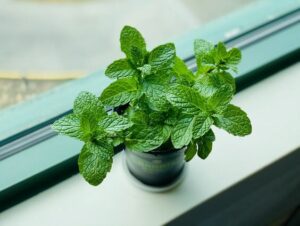
Oregano – Oregano is rich in antioxidants and has antibacterial properties. It may help boost the immune system and reduce inflammation. Sprinkle dried oregano over pizza, pasta, or roasted vegetables, or use fresh oregano in Greek and Italian dishes.
Thyme – Thyme is an excellent source of vitamins C and A. It also contains compounds that may help soothe coughs and sore throats. Use fresh thyme in poultry and stuffing recipes or add dried thyme to soups, stews, and roasted meats.
Parsley – Parsley is a rich source of vitamin C, vitamin K, and antioxidants. It may support bone health and immune function. Sprinkle chopped fresh parsley over dishes for a burst of color and flavor. It’s a common garnish for pasta, salads, and soups.
Sage – Sage has anti-inflammatory and antioxidant properties. It may support memory and cognitive function. Use fresh sage leaves in poultry stuffing, or add dried sage to dishes like sausage stuffing or roasted butternut squash.
Dill – Dill is a good source of vitamin C and has antimicrobial properties. It can help aid digestion and soothe digestive discomfort. Add fresh dill to seafood dishes, salads, or use it in pickling recipes. It pairs well with cucumbers and yogurt in tzatziki sauce.
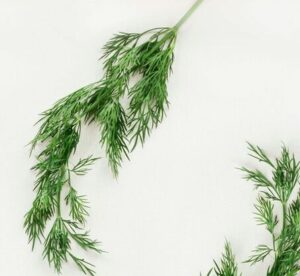
Chives – Chives are rich in vitamins A and K. They contain allicin, which may have antimicrobial and heart-protective properties. I love to chop fresh chives as a garnish for baked potatoes, scrambled eggs, or creamy soups. They add a mild onion flavor and really uplift your dish to new levels of taste!
Ways to Use Herbs and Spices
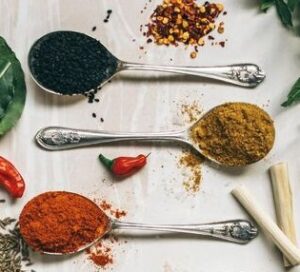
Fresh Herbs – Fresh herbs like basil, cilantro, mint, and parsley can be used to add a burst of flavor to dishes. They’re excellent in salads, soups, and as garnishes for proteins. Seniors can grow small herb gardens indoors or on balconies, providing a ready supply of fresh herbs for cooking.
Dried Spices – Dried spices, such as paprika, cumin, and thyme, have a longer shelf life and are convenient to use. They can be added to a wide range of dishes, from stews and curries to roasted vegetables. Combining different spices can create complex and layered flavors, allowing seniors to experiment with various cuisines and tastes.
Herb Blends – Many spice companies offer pre-made herb and spice blends designed to complement specific types of dishes, like Italian seasoning or Cajun spice blends. These blends are an easy way for seniors to add flavor without having to measure multiple spices individually.
Infused Oils and Vinegars – Seniors can experiment with infused oils (e.g., garlic-infused olive oil) and flavored vinegars like balsamic vinegar with herbs to add depth to salads, marinades, and sautéed dishes.
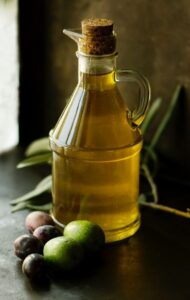
Homemade Spice Mixes – Crafting homemade spice mixes allows seniors to tailor flavors to their preferences and dietary restrictions. They can reduce or eliminate ingredients like sugar and salt while maximizing the use of herbs and spices.
The Wrap

Incorporating these herbs into your meals not only enhances flavor but also brings a range of health benefits. Whether you’re a seasoned cook or a novice in the kitchen, experimenting with herbs can take your dishes to a whole new level of taste and nutrition.
Tips For Cooking Perfect Rice Every Time
Tips for Perfect Rice Every Time: Fluffy and Tender Grains Rice is such a versatile side, and cooking it should be easy! I say that…
Best Kitchen Gadgets for the Elderly
Kitchen Gadgets for the Elderly Welcome to my guide on essential kitchen gadgets for the elderly. As we age, certain tasks in the kitchen can…
Improve Your Knife Skills
Improve Your Knife Skills : Tips and Techniques Have you ever considered how much time is spent in the kitchen cutting and chopping? It is…
Best Stove Top Kettles
I find that nothing is more satisfying than the whistling sound of a stove top kettle. It is time for tea, relaxing, family bonding, or…

